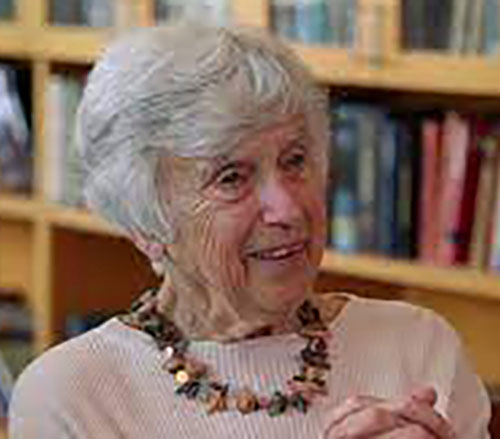
One of neuropsychology’s most influential leaders has died. We will miss her enthusiasm, her strong opinions, her ready laugh, and her fearlessness. Dr. Muriel Deutsch Lezak died on October 6, 2021 at the age of 94. Dr. Lezak needs no introduction because all of us have read one or all of her five editions of Neuropsychological Assessment, which has been a valuable resource for neuropsychologists, neurologists, and neuroscientists since its first publication in 1976. The small 514-page first edition, which she published as the sole author, doubled in size by the 5th edition, which was published in 2012 with 3 co-authors (Howieson, Bigler, Tranel). The 6th Edition is in progress and for the first time will be called Lezak’s Neuropsychological Assessment as a tribute to Dr. Lezak’s contribution in perpetuity. Given the book’s success, it’s hard to believe that she sent the prospectus to 25 publishers before it was accepted by Oxford University Press.
After receiving a Master’s Degree in Human Development from the University of Chicago in 1949, Dr. Lezak married the love of her life, Sid Lezak, and headed for Portland Oregon. Eleven years and three children later she received her Ph.D. in Clinical Psychology at the University of Portland in 1960–attending night classes while her husband took care of their three children. She worked for many years at the Portland VA Medical Center and then in the Neurology Department at the Oregon Health & Science University where she had been a Professor Emeritus since 2006. She was also one of the first board-certified neuropsychologists (American Board of Clinical Neuropsychology of the American Board of Professional Psychology). She loved her patients and their families and always said that listening and observing her patients taught her neuropsychology. Her concern for the families of patients led to organizing family support groups and is further emphasized by her Presidential Address for the International Neuropsychological Society, which was entitled ‘Brain damage is a family affair.’ Her curiosity never allowed her to take a test score at face value; she paid attention to the patient’s strategies and errors to generate explanations for their deficits. She passed on her enthusiasm for understanding brain behavior relationships to predoctoral interns, and those seminars became the basis for the first edition of her book.
Dr. Lezak received many national and international accolades (APA fellow, Arthur Benton Lectureship from the American Psychological Foundation, Distinguished Career Awards from the International Neuropsychological Society and National Academy of Neuropsychology, President of the International Neuropsychological Society, University of Chicago Professional Achievement Award, and Oregon Brain Injury Alliance Lifetime Achievement Award). Throughout her long career, she lectured around the world and travelled extensively, especially to France. She was active professionally into her 80 s serving as a Senior Full Bright Scholar in Australia and performing forensic evaluations. Muriel was also a Francophile. She spent many summers in France, read mysteries in French and gave one of her last lectures in French.
Muriel Lezak led a full and productive life with many friends inside and outside of Neuropsychology. Her husband was Oregon’s longest-serving U.S. Attorney when he died in 2006, and her son, David, died in 2014. She was devoted to her two surviving daughters and her many grandchildren who were her frequent travel companions.
We will miss her. She was a force—so bright and so funny. Neuropsychology would not be the same without her impressive contributions. Thank you, Muriel. You are gone but will not be forgotten.
Department of Neurology, Oregon Health & Science University, School of Medicine, Portland, Oregon, USA Kathleen Y. Haaland
Department of Psychiatry & Behavioral Sciences, University of New Mexico Health Sciences Center, Albuquerque, New Mexico, USA
[email protected]
